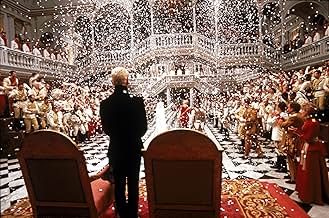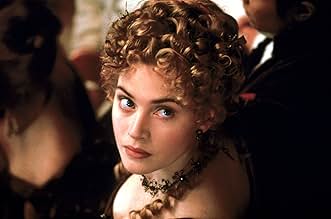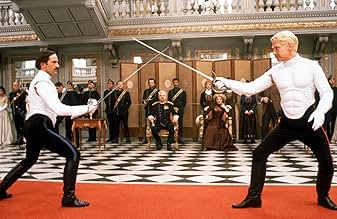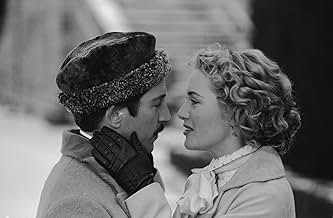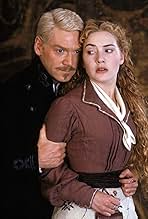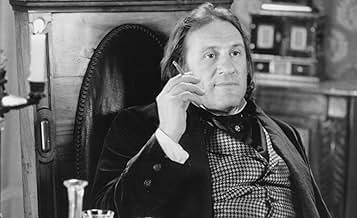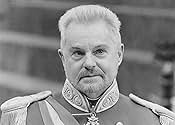CALIFICACIÓN DE IMDb
7.7/10
41 k
TU CALIFICACIÓN
Hamlet, el Príncipe de Dinamarca, vuelve a casa para descubrir que su padre ha sido asesinado y que su madre va a contraer matrimonio con su tío, el asesino de su padre. Mientras, una guerra... Leer todoHamlet, el Príncipe de Dinamarca, vuelve a casa para descubrir que su padre ha sido asesinado y que su madre va a contraer matrimonio con su tío, el asesino de su padre. Mientras, una guerra está a punto de explotar.Hamlet, el Príncipe de Dinamarca, vuelve a casa para descubrir que su padre ha sido asesinado y que su madre va a contraer matrimonio con su tío, el asesino de su padre. Mientras, una guerra está a punto de explotar.
- Dirección
- Guionistas
- Elenco
- Nominado a 4 premios Óscar
- 9 premios ganados y 25 nominaciones en total
Rizz Abbasi
- Attendant to Claudius
- (as Riz Abbasi)
- Dirección
- Guionistas
- Todo el elenco y el equipo
- Producción, taquilla y más en IMDbPro
Opiniones destacadas
What an ambitious project Kenneth Branagh undertook here and how well it was realized! This is the first filmed version of 'Hamlet' to use the full text of Shakespeare's play, but Branagh didn't do it just because "it was there." His intention, I believe, was to make the play accessible and understandable to the general viewer without dumbing it down, so to speak. In return he asks viewers to put in a little work themselves, a fair enough proposition and one that's a bargain.
The setting is a generic 19th century European one and this does more than work well, it keeps a modern or ancient look from possibly distracting from the work itself. The production design and cinematography and both outstanding, which helps immensely when you're watching a four-hour movie. Branagh's casting once again is inspired and the acting is likewise. The direction accomplishes the heavy task of making this a movie rather than a deluxe version of a play. Since so much of 'Hamlet' is based on interior monologue and there are relatively few duels, battles, etc., this can be a daunting task. But everything Branagh tries to do seems to work.
Branagh has always been one of the most interesting actor/writer/directors, if not always the best, since he made his big splash with 'Henry V.' One quibble I had with him was what I saw as a tendency to ham it up at times. In his portrayal of Hamlet here he might be accused of that again, but there is a method at work. Let's face it, 'Hamlet' is not an easy work for the average person to understand and if one has never seen it performed before, he or she needs help even if they've read the play. Hamlet has the most lines of any Shakespearian character and Branagh makes sure that his viewers know what this man is thinking and feeling throughout the film, even if you don't know the literal meaning of every arcane word. This performance by Branagh was at the very least worthy of an Oscar nomination.
There are so many other outstanding performances here they're almost too numerous to mention, but some of them must be acknowledged. Derek Jacobi as Claudius is superb but even he takes a back seat to Kate Winslet when it comes to handing out praise. Her portrayal of Ophelia is awesome in its depth of feeling, made only more outstanding by the knowledge that she was only about 20 years old at the time! She looks to me like the finest young actress around. Other super performers in no particular order are Richard Briers, Nicholas Farrell, Michael Maloney, and Reece Dinsdale and Timothy Spall as Guildenstern and Rosencrantz, respectively. Honorable mention goes to Julie Christie, Charlton Heston, and Robin Williams, who manages to do his thing here successfully. Even Billy Crystal as a gravedigger works. The one cast member who doesn't, inexplicably, is Jack Lemmon. In the very opening scene he appears, and while the other three actors do a great job at setting the tense mood, Lemmon sounds like he is just running lines in rehearsal as a favor. You know this must have been a real dilemma for Branagh, since everything else about the movies screams out that it's the work of a perfectionist.
Not to be facetious when speaking of a four-hour movie, but it does seem just a tad too long. Some monologues and conversations do tend to go on a bit, if I may be so bold, and a little bit of judicious pruning would be welcome.
Did I forget anything, other than Patrick Doyle's score? No doubt I did. I'll just sum up by saying that Kenneth Branagh may have made the definitive film version of 'Hamlet,' and it will be a truly monumental production that tops this one.
The setting is a generic 19th century European one and this does more than work well, it keeps a modern or ancient look from possibly distracting from the work itself. The production design and cinematography and both outstanding, which helps immensely when you're watching a four-hour movie. Branagh's casting once again is inspired and the acting is likewise. The direction accomplishes the heavy task of making this a movie rather than a deluxe version of a play. Since so much of 'Hamlet' is based on interior monologue and there are relatively few duels, battles, etc., this can be a daunting task. But everything Branagh tries to do seems to work.
Branagh has always been one of the most interesting actor/writer/directors, if not always the best, since he made his big splash with 'Henry V.' One quibble I had with him was what I saw as a tendency to ham it up at times. In his portrayal of Hamlet here he might be accused of that again, but there is a method at work. Let's face it, 'Hamlet' is not an easy work for the average person to understand and if one has never seen it performed before, he or she needs help even if they've read the play. Hamlet has the most lines of any Shakespearian character and Branagh makes sure that his viewers know what this man is thinking and feeling throughout the film, even if you don't know the literal meaning of every arcane word. This performance by Branagh was at the very least worthy of an Oscar nomination.
There are so many other outstanding performances here they're almost too numerous to mention, but some of them must be acknowledged. Derek Jacobi as Claudius is superb but even he takes a back seat to Kate Winslet when it comes to handing out praise. Her portrayal of Ophelia is awesome in its depth of feeling, made only more outstanding by the knowledge that she was only about 20 years old at the time! She looks to me like the finest young actress around. Other super performers in no particular order are Richard Briers, Nicholas Farrell, Michael Maloney, and Reece Dinsdale and Timothy Spall as Guildenstern and Rosencrantz, respectively. Honorable mention goes to Julie Christie, Charlton Heston, and Robin Williams, who manages to do his thing here successfully. Even Billy Crystal as a gravedigger works. The one cast member who doesn't, inexplicably, is Jack Lemmon. In the very opening scene he appears, and while the other three actors do a great job at setting the tense mood, Lemmon sounds like he is just running lines in rehearsal as a favor. You know this must have been a real dilemma for Branagh, since everything else about the movies screams out that it's the work of a perfectionist.
Not to be facetious when speaking of a four-hour movie, but it does seem just a tad too long. Some monologues and conversations do tend to go on a bit, if I may be so bold, and a little bit of judicious pruning would be welcome.
Did I forget anything, other than Patrick Doyle's score? No doubt I did. I'll just sum up by saying that Kenneth Branagh may have made the definitive film version of 'Hamlet,' and it will be a truly monumental production that tops this one.
First, what I didn't like. The acting was not really up to the Hamlet standard. Branagh was really over-the-top, doing a lot of yelling mostly. In my opinion, those actors who were not big-name celebrities generally did a better job; though I would except Billy Crystal and Robin Williams. (And Charlton Heston, too, but I wasn't sure if he was playing at being a hack.) A lot of the ambiguities in the play were clearly resolved one way in the flashbacks.
What I think speaks very much in this play's favor is that it is accessible. Shakespeare is hard to understand for the vast majority of people nowadays; many people are not even inclined to try, because of its reputation as Serious Literature and its archaic English. If they see this film they will understand clearly at least one man's interpretation of the play. They will be seeing it more as Shakespeare's audiences saw it: a play with sword fights and battles, and mighty kings and nobles, murder and incest and evil schemes and ghosts--and great art, if one cares to look for it, but in Shakespeare's day most didn't, any more than most people do now. Branagh's overacting, and his forcing of his interpretation of the story on the viewer, may detract from Shakespeare's art somewhat, but it is better that modern audiences get a piece of it, rather than nothing.
I've got to say one more thing though. Some people are complaining that "it's set in the 19th century and that wasn't Shakespeare's time". Well, in Shakespeare's time their costume and scenery was that of their own day for all of their plays. Shakespeare may have SAID it's in the days of ancient Rome or medieval Denmark or whatever, but he didn't dress his characters up like they were, he used the costumes of his own time. For the same reason his plays are full of anachronisms. For example, in King John the English and French have cannons--in Robin Hood's day. In Julius Caesar they talk of chimneys, which wouldn't be invented for another thousand years, and in Henry IV they talk about Machiavelli, who wasn't even born yet then. So I think this objection is silly--you might as well complain that the play isn't in Danish (after all they live in Denmark don't they?).
What I think speaks very much in this play's favor is that it is accessible. Shakespeare is hard to understand for the vast majority of people nowadays; many people are not even inclined to try, because of its reputation as Serious Literature and its archaic English. If they see this film they will understand clearly at least one man's interpretation of the play. They will be seeing it more as Shakespeare's audiences saw it: a play with sword fights and battles, and mighty kings and nobles, murder and incest and evil schemes and ghosts--and great art, if one cares to look for it, but in Shakespeare's day most didn't, any more than most people do now. Branagh's overacting, and his forcing of his interpretation of the story on the viewer, may detract from Shakespeare's art somewhat, but it is better that modern audiences get a piece of it, rather than nothing.
I've got to say one more thing though. Some people are complaining that "it's set in the 19th century and that wasn't Shakespeare's time". Well, in Shakespeare's time their costume and scenery was that of their own day for all of their plays. Shakespeare may have SAID it's in the days of ancient Rome or medieval Denmark or whatever, but he didn't dress his characters up like they were, he used the costumes of his own time. For the same reason his plays are full of anachronisms. For example, in King John the English and French have cannons--in Robin Hood's day. In Julius Caesar they talk of chimneys, which wouldn't be invented for another thousand years, and in Henry IV they talk about Machiavelli, who wasn't even born yet then. So I think this objection is silly--you might as well complain that the play isn't in Danish (after all they live in Denmark don't they?).
I must say that, looking at Hamlet from the perspective of a student, Brannagh's version of Hamlet is by far the best. His dedication to stay true to the original text should be applauded. It helps the play come to life on screen, and makes it easier for people holding the text while watching, as we did while studying it, to follow and analyze the text.
One of the things I have heard criticized many times is the casting of major Hollywood names in the play. I find that this helps viewers recognize the characters easier, as opposed to having actors that all look and sound the same that aid in the confusion normally associated with Shakespeare.
Also, his flashbacks help to clear up many ambiguities in the text. Such as how far the relationship between Hamlet and Ophelia really went and why Fortinbras just happened to be at the castle at the end. All in all, not only does this version contain some brilliant performances by actors both familiar and not familiar with Shakespeare. It is presented in a way that one does not have to be an English Literature Ph.D to understand and enjoy it.
One of the things I have heard criticized many times is the casting of major Hollywood names in the play. I find that this helps viewers recognize the characters easier, as opposed to having actors that all look and sound the same that aid in the confusion normally associated with Shakespeare.
Also, his flashbacks help to clear up many ambiguities in the text. Such as how far the relationship between Hamlet and Ophelia really went and why Fortinbras just happened to be at the castle at the end. All in all, not only does this version contain some brilliant performances by actors both familiar and not familiar with Shakespeare. It is presented in a way that one does not have to be an English Literature Ph.D to understand and enjoy it.
Olivier, Kosentsev, Richardson, Coranado, Zefferelli, and Almerayeda have all directed Hamlet but Branagh's the only one who got it right.
This is the only film of "Hamlet" that contains the full four hours of William Shakespeare's masterpiece and gives a unique feel to the whole story.
Not many directors could pull this off without boring their audience but Branagh's skillful use of bravora film style and stunt casting allows people to see the importance of the scenes that are usually cut out.
Examples of this include Gerarde Depardue as Ranyaldo whos entire purpose in the film was to simply say "yes my lord" as Polonius asks him to spy on Leartes. This also included Billy Crystal as the grave digger, Robin Williams as Osric, Jack Lemmon as Marcellous, and Charlton Heston as the actor.
Branagh's performance of the Act 4 scene 4 soliloquy (Which again is usually cut out) is nothing short of c cinematic marvel as the camera slowly pulls back as the intensity grows. It is a scene that literally made me want to jump out of my chair and start applauding.
Branagh is the only film maker that understood the importance of every scene in this film and knew how to convey that importance to the general audience.
This is a must see for everyone who enjoy's good story telling, brilliant acting,and incredible direction. All of these part of William Shakespeares greatest triumph.
This is the only film of "Hamlet" that contains the full four hours of William Shakespeare's masterpiece and gives a unique feel to the whole story.
Not many directors could pull this off without boring their audience but Branagh's skillful use of bravora film style and stunt casting allows people to see the importance of the scenes that are usually cut out.
Examples of this include Gerarde Depardue as Ranyaldo whos entire purpose in the film was to simply say "yes my lord" as Polonius asks him to spy on Leartes. This also included Billy Crystal as the grave digger, Robin Williams as Osric, Jack Lemmon as Marcellous, and Charlton Heston as the actor.
Branagh's performance of the Act 4 scene 4 soliloquy (Which again is usually cut out) is nothing short of c cinematic marvel as the camera slowly pulls back as the intensity grows. It is a scene that literally made me want to jump out of my chair and start applauding.
Branagh is the only film maker that understood the importance of every scene in this film and knew how to convey that importance to the general audience.
This is a must see for everyone who enjoy's good story telling, brilliant acting,and incredible direction. All of these part of William Shakespeares greatest triumph.
Part of the genius of Branagh's interpretation of Hamlet is in the use of the techniques of the cinema to enhance the production. Branagh has not condensed the acts like some mass market soup, as was done in Olivier's 1948 Oscar-winning production, or in, say, Zeffirelli's 1989 Hamlet lite starring Mel Gibson (both excellent, though, within their scope), but has kept every word while directing our understanding so that even those only casually familiar with the play might follow the intent and purpose with discernment. Recall that for Shakespeare--the ultimate actor's playwright who wrote with precious few stage directions--interpretation was left to the direction and the actors, an open invitation that Branagh rightly accepts.
The use of flashback scenes of things implied, such as the amorous union of Ophelia and her Lord Hamlet abed, or of a vast expanse of snow darkened with distant soldiers to represent the threat of Fortinbras' army from without, and especially the vivid remembrance in the mind's eye of the new king's dastardly deed of murder most foul, helps us all to more keenly appreciate just what it is that torments Hamlet's soul. I also liked the intense closeups. How they would have bemused and delighted an Elizabethan audience.
Branagh's ambitious Hamlet is also one of the most accessible and entertaining, yet without the faintest hint of any dumbing down or abbreviation. A play is to divert, to entertain, to allow us to identify with others who trials and tribulations are so like our own. And so first the playwright seeks to engage his audience, and only then, by happenstance and indirection, to inspire and to inform. Shakespeare did this unconsciously, we might say. He wrote for the popular audience of his time, a broad audience, it should be noted, that included kings and queens as well as knaves and beggars, and he reached them, one and all. We are much removed from those times, and yet, this play, this singular achievement in theatre, still has the power to transcend mere entertainment, to fuse poetry and story, as well as the high and the low, and speak once again to a new audience twenty generations removed.
Branagh himself is a wonderful Hamlet, perhaps a bit of a ham at times (as I think was Shakespeare's intent), a prince who is the friend of itinerant players. He also lacks somewhat in statute (as we conceive our great heroes); nonetheless his interpretation of the great prince's torment and his singular obsession to avenge his father's murder speaks strongly to us all. Branagh, more than any other Hamlet, makes us understand the distracted, anguished and tortured prince, and guides us to not only an appreciation of his actions, wild and crazy as they sometimes are, but to an identification and an understanding of why (the eternal query) Hamlet is so long in assuming the name of action. In Branagh's production, this old quibble with Hamlet's character dissolves itself into a dew, and we realize that he was acting strongly, purposely all the while. He had to know the truth without doubt so that he might act in concert with it.
I was also very much impressed with Derek Jacobi's Claudius. One recalls that Jacobi played Hamlet in the only other full cinematic production of the play that I know of, produced in 1980 by the BBC with Claire Bloom as Gertrude; and he was an excellent Hamlet, although perhaps like Branagh something less than a massive presence. His Claudius combines second son ambition with a Machiavellian heart, whose words go up but whose thoughts remind below, as is the way of villains everywhere.
Kate Winslet is a remarkable Ophelia, lending an unusual strength to the role (strength of character is part of what Kate Winslet brings to any role), but with the poor, sweet girl's vulnerability intact. She does the mad scene with Claudius as well as I have seen it done, and of course her personal charisma and beauty embellish the production.
Richard Briers as Polonius, proves that that officious fool is indeed that, and yet something more so that we can see why he was a counselor to the king. The famous speech he gives to Laertes as his son departs for France, is really ancient wisdom even though it comes from a fool.
Julie Christie was a delight as the besmirched and wretched queen. In the bedroom scene with Hamlet she becomes transparent to not only her son, but to us all, and we feel that the camera is reaching into her soul. She is outstanding.
The bit players had their time upon the stage and did middling well to very good. I liked Charlton Heston's player king (although I think he and John Gielgud might have switched roles to good effect) and Billy Crystal's gravedigger was finely etched. Only Jack Lemon's Marcellus really disappointed, but I think that was mainly because he was so poorly cast in such a role. Not once was he able to flash the Jack Lemon grin that we have come to know so well.
The idea of doing a Shakespearean play with nineteenth century dress in the late twentieth century worked wonderfully well, but I know not why. Perhaps the place and dress are just enough removed from our lives that they are somewhat strange but recognizable in a pleasing way. And perhaps it is just another tribute to the timeless nature of Shakespeare's play.
There is so much more to say about this wonderful cinematic production. It is, all things considered, one of the best Hamlets ever done. Perhaps it is the best. See it, by all means, see it for yourself.
(Note: Over 500 of my movie reviews are now available in my book "Cut to the Chaise Lounge or I Can't Believe I Swallowed the Remote!" Get it at Amazon!)
The use of flashback scenes of things implied, such as the amorous union of Ophelia and her Lord Hamlet abed, or of a vast expanse of snow darkened with distant soldiers to represent the threat of Fortinbras' army from without, and especially the vivid remembrance in the mind's eye of the new king's dastardly deed of murder most foul, helps us all to more keenly appreciate just what it is that torments Hamlet's soul. I also liked the intense closeups. How they would have bemused and delighted an Elizabethan audience.
Branagh's ambitious Hamlet is also one of the most accessible and entertaining, yet without the faintest hint of any dumbing down or abbreviation. A play is to divert, to entertain, to allow us to identify with others who trials and tribulations are so like our own. And so first the playwright seeks to engage his audience, and only then, by happenstance and indirection, to inspire and to inform. Shakespeare did this unconsciously, we might say. He wrote for the popular audience of his time, a broad audience, it should be noted, that included kings and queens as well as knaves and beggars, and he reached them, one and all. We are much removed from those times, and yet, this play, this singular achievement in theatre, still has the power to transcend mere entertainment, to fuse poetry and story, as well as the high and the low, and speak once again to a new audience twenty generations removed.
Branagh himself is a wonderful Hamlet, perhaps a bit of a ham at times (as I think was Shakespeare's intent), a prince who is the friend of itinerant players. He also lacks somewhat in statute (as we conceive our great heroes); nonetheless his interpretation of the great prince's torment and his singular obsession to avenge his father's murder speaks strongly to us all. Branagh, more than any other Hamlet, makes us understand the distracted, anguished and tortured prince, and guides us to not only an appreciation of his actions, wild and crazy as they sometimes are, but to an identification and an understanding of why (the eternal query) Hamlet is so long in assuming the name of action. In Branagh's production, this old quibble with Hamlet's character dissolves itself into a dew, and we realize that he was acting strongly, purposely all the while. He had to know the truth without doubt so that he might act in concert with it.
I was also very much impressed with Derek Jacobi's Claudius. One recalls that Jacobi played Hamlet in the only other full cinematic production of the play that I know of, produced in 1980 by the BBC with Claire Bloom as Gertrude; and he was an excellent Hamlet, although perhaps like Branagh something less than a massive presence. His Claudius combines second son ambition with a Machiavellian heart, whose words go up but whose thoughts remind below, as is the way of villains everywhere.
Kate Winslet is a remarkable Ophelia, lending an unusual strength to the role (strength of character is part of what Kate Winslet brings to any role), but with the poor, sweet girl's vulnerability intact. She does the mad scene with Claudius as well as I have seen it done, and of course her personal charisma and beauty embellish the production.
Richard Briers as Polonius, proves that that officious fool is indeed that, and yet something more so that we can see why he was a counselor to the king. The famous speech he gives to Laertes as his son departs for France, is really ancient wisdom even though it comes from a fool.
Julie Christie was a delight as the besmirched and wretched queen. In the bedroom scene with Hamlet she becomes transparent to not only her son, but to us all, and we feel that the camera is reaching into her soul. She is outstanding.
The bit players had their time upon the stage and did middling well to very good. I liked Charlton Heston's player king (although I think he and John Gielgud might have switched roles to good effect) and Billy Crystal's gravedigger was finely etched. Only Jack Lemon's Marcellus really disappointed, but I think that was mainly because he was so poorly cast in such a role. Not once was he able to flash the Jack Lemon grin that we have come to know so well.
The idea of doing a Shakespearean play with nineteenth century dress in the late twentieth century worked wonderfully well, but I know not why. Perhaps the place and dress are just enough removed from our lives that they are somewhat strange but recognizable in a pleasing way. And perhaps it is just another tribute to the timeless nature of Shakespeare's play.
There is so much more to say about this wonderful cinematic production. It is, all things considered, one of the best Hamlets ever done. Perhaps it is the best. See it, by all means, see it for yourself.
(Note: Over 500 of my movie reviews are now available in my book "Cut to the Chaise Lounge or I Can't Believe I Swallowed the Remote!" Get it at Amazon!)
¿Sabías que…?
- TriviaRobin Williams and Billy Crystal were not allowed to be on the set at the same time during filming, for fear they would crack up the cast and crew, and cause major production delays.
- ErroresIn the very long shot along the length of the throne room, the cameras are visible in the mirrors.
- Versiones alternativasTwo versions should have been theatrically released at the same time: a complete 242-minutes director's cut shown only in selected venues (large key cities) and a shorter, wide-release version that ran about two-and-a-half hours. After some critical backlash, Castle Rock decided to release the complete 4 hours everywhere in the US and use the shorter version for some overseas territories.
- Bandas sonorasIn Pace
Music by Patrick Doyle
Performed by Plácido Domingo
Text for The Book of Wisdom
Text researched and adapted by Russell Jackson
Recorded at Studio 33, Hamburg, Germany
Engineered by Ambrogio Crotte and Luis Rodriguez
Original soundtrack available on Sony Classical Records
Selecciones populares
Inicia sesión para calificar y agrega a la lista de videos para obtener recomendaciones personalizadas
Detalles
- Fecha de lanzamiento
- Países de origen
- Idioma
- También se conoce como
- William Shakespeare's Hamlet
- Locaciones de filmación
- Productoras
- Ver más créditos de la compañía en IMDbPro
Taquilla
- Presupuesto
- USD 18,000,000 (estimado)
- Total en EE. UU. y Canadá
- USD 4,708,156
- Fin de semana de estreno en EE. UU. y Canadá
- USD 90,684
- 29 dic 1996
- Total a nivel mundial
- USD 6,296,790
- Tiempo de ejecución4 horas 2 minutos
- Color
- Relación de aspecto
- 2.20 : 1
Contribuir a esta página
Sugiere una edición o agrega el contenido que falta




